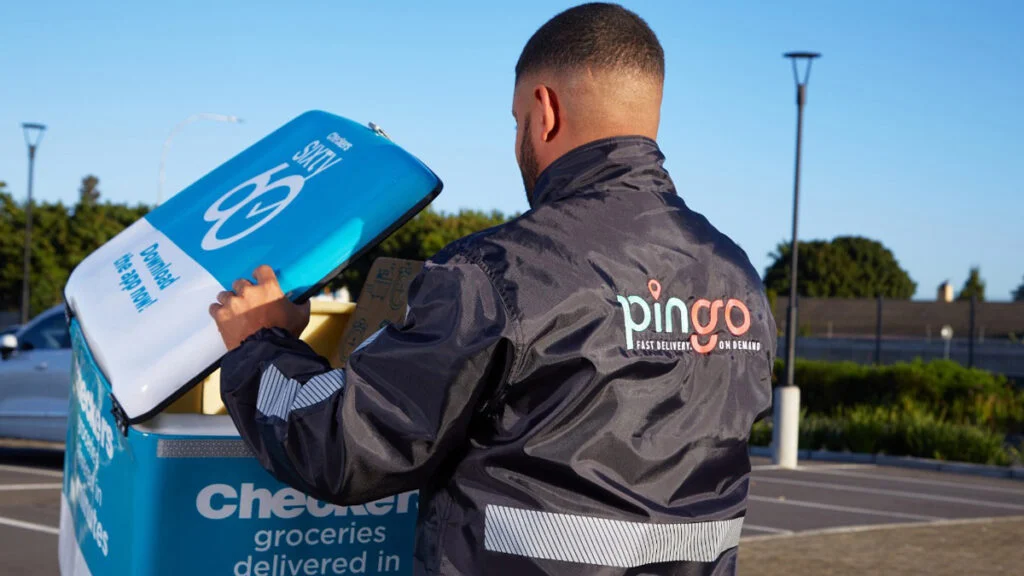SA’s Shoprite-Owned On-demand Delivery Leader Faces Mounting Scrutiny

South Africa’s leading on-demand grocery delivery service, Checkers Sixty60, is facing increased scrutiny amid allegations over labour practices, uncertain employment structures, and a high reliance on foreign workers. This comes as parent company Shoprite secures control of the logistics backbone, Pingo Delivery, to further scale the platform.
Checkers Sixty60, launched in 2019, quickly became the frontrunner in South Africa’s on-demand delivery market. Known for its speed and convenience, the app’s success has bolstered Checkers’ competitive position against high-end grocer Woolworths, and many middle-class South Africans now prefer using Sixty60 over traditional in-store shopping.
Despite Sixty60’s popularity, recent reports suggest that the rapid rise has come at a cost to its delivery riders. Pingo, a logistics provider co-owned by South Africa’s top supermarket chain Shoprite and responsible for managing Sixty60’s workforce, is under fire for allegedly exploiting riders by treating them as “independent contractors” rather than employees.
As independent contractors, riders lack essential protections under South African labour laws, receiving no benefits and having limited job security. According to Democratic Alliance MP Michael Bagraim, this classification is a mischaracterisation of their role, and he believes “South Africa’s courts would likely rule that the Checkers Sixty60 riders were Shoprite employees” based on their working hours and limited ability to work elsewhere.
Oversupply of Riders and Wage Concerns
Interviews with current and former riders reveal further concerns over Pingo’s hiring practices and remuneration structure. According to one former rider who spoke to MyBroadband, rider often face unpredictable hiring and firing cycles, with Pingo regularly recruiting more riders than needed for demand.
This oversupply has reportedly resulted in some riders being “randomly blocked from using the app,” restricting their earning opportunities. A noted that such cycles led to mass dismissals twice a year, affecting up to 15 riders at a time, “leaving them without an income.”
Additionally, Pingo has been criticised for inconsistent wage policies. Riders initially received a minimum daily fee of ZAR 350.00 (~USD 20.00) regardless of the number of deliveries completed, but this minimum was removed, sparking multiple strikes among riderss.
“Without a minimum fee, this total would be much lower,” explained one rider, adding that riders rely on the guarantee due to their expenses, which include covering their own fuel and bike rental costs. One person estimated their monthly take-home pay at ZAR 2.8 K (~USD 158) after these expenses, highlighting the tight margins many face.
Reliance on Foreign Workers
Another pressing issue is Pingo’s alleged preference for hiring foreign nationals. This hiring practice has sparked concerns about exploitation, with suggestions that foreign workers may be more vulnerable to unfavourable working conditions.
This workforce makeup also raises safety concerns. Hein Jonker, founder of the Motorcycle Safety Institute of South Africa, noted that some foreign workers reportedly lack valid motorcycle licenses or training, increasing risks on the road. “Their lack of training and the pressure of the need for quick deliveries put their and other road users’ lives at risk,” Jonker said.
Shoprite’s Acquisition and Future Plans for Pingo
Shoprite recently received approval from South Africa’s Competition Commission to acquire full ownership of Pingo, a strategic move Shoprite CEO Pieter Engelbrecht said would help the retailer control its logistics and meet growing demand more efficiently. “We need to have the entire value chain delivered at speed with continuous enhancements,” Engelbrecht told News24, adding that relying on third-party logistics posed challenges for Shoprite’s rapid growth.
With this acquisition, Shoprite is not only expanding its Sixty60 brand but reportedly exploring ways to serve spaza shop owners (small neighbourhood stores) through its wholesale arm, Cash & Carry. This potential pivot could broaden Pingo’s reach and increase its operational complexity as it scales.
Legal and Ethical Implications
The debate over driver classification and treatment has reignited discussions on employment law, with Bagraim suggesting that Shoprite could struggle to justify its current employment model if challenged. According to Bagraim, “Unless the drivers work for a couple of companies at different times, it cannot be said that they are independent contractors.”
For its part, Shoprite and Pingo have not commented on these allegations directly but have stated that rider app blocks are tied to “service contract violations.” However, multiple reports of sudden dismissals, app blocks, and bike confiscations paint a troubling picture. A MyBroadband investigation found that riders have experienced blocked access and removal of their bikes without warning, leaving some without recourse to understand or contest their dismissal.
As Checkers Sixty60 continues to grow, Shoprite will likely face increasing pressure to address these allegations and consider adjustments to its employment practices. With rising public scrutiny and potential legal challenges, Sixty60’s approach to rider welfare could become a defining issue for South Africa’s largest grocery retailer in its bid to remain a leader in the on-demand delivery market.